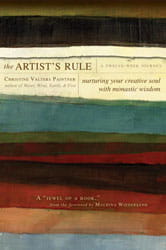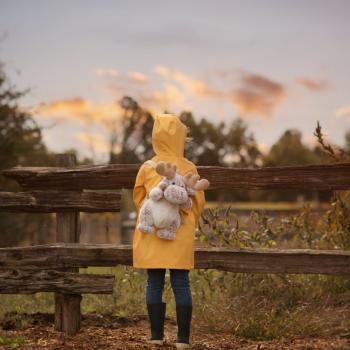 This month in the Patheos Book Club, we're hosting a conversation on the new book The Artist's Rule: Nurturing Your Creative Soul with Monastic Wisdom, by Spiritual Director Christine Valters Paintner. Read an excerpt from Chapter One below and join the conversation.
This month in the Patheos Book Club, we're hosting a conversation on the new book The Artist's Rule: Nurturing Your Creative Soul with Monastic Wisdom, by Spiritual Director Christine Valters Paintner. Read an excerpt from Chapter One below and join the conversation.
Chapter 1: Establishing a Creative, Contemplative Practice
There is in us an instinct for newness, for renewal, for a liberation of creative power. We seek to awaken in ourselves a force which really changes our lives from within. And yet the same instinct tells us that this change is a recovery of that which is deepest, most original, most personal in ourselves. To be born again is not to become somebody else, but to become ourselves.
—THOMAS MERTON
As we begin, I want to take a moment to encourage you to check in with yourself regularly during these next few weeks of journeying through this material. One of the most important things I can teach is learning to make space to listen to your own deepest longings and to begin to trust those more. There are all kinds of reasons we learn to doubt ourselves, especially when it comes to artistic expression. Part of growth is taking risks, so I encourage boldness, but I equally encourage gentleness with yourself. When you begin a creative adventure like this—which is an extension of the journey you've already begun—you open yourself to your vulnerability, to the dreams just beginning to bud within, to the risk inherent in expressing your deepest self. There may be weeks where things feel more tender and you need to hold back just a little. Give yourself permission to do this.
My training in the arts is in the field of expressive arts, which engages creativity for self-expression, healing, and transformation. Through this lens, the process of art-making becomes a place of sacred discovery. When I make suggestions for the weekly creative exercises—in visual art, poetry, and movement—I encourage you to enter into the experience as a prayer, a communion with your Creative Source, and to see if you can release your worries about making a beautiful product. As an authentic expression of your longings and unique soul, what you make inevitably will have its own beauty. There is certainly a place for the role of craft and fine art, and many of you may already be involved with the fine-art or craft world. Our focus here, however, is on the process rather than the product and on allowing the expression to come through as fully and authentically as possible. When judgments arise in the process, simply notice them with curiosity and compassion and contemplate where else in your life those voices arise. (I will address this far more extensively in the chapter on inner hospitality.) Allow the art-making process to become a container for your internal awareness, much like in meditation practice. The same is true for writing: allow yourself to express whatever is true for you in the process and, gently and with compassion for yourself, notice where the blocks, judgments, and voices arise. Give yourself permission to make mistakes, to make "bad art," or to write something that doesn't sound even close to perfect. This is the way we begin to cultivate inner freedom, by allowing ourselves a full range of expression as a journey of discovery.
Each time you begin an art experience, make some time to quiet yourself and connect to your breath, heartbeat, and body. Move into a receptive posture of stillness, which helps to quiet the judging mind and opens you to the gifts being offered. Each time you complete an art exploration or a prayer experience, offer thanks for this time spent with your inner monk or artist, and allow your heart to fill with gratitude for whatever wisdom has been revealed. The way of the monk and the path of the artist are teachers of slowness, of savoring, of seeing the world below surfaces.
Notice what the art materials themselves have to teach you in a given experience. Be present to the tactile qualities of collage and paint, of writing and movement, and what each one stirs or challenges in you. Allow this awareness to be a part of paying attention to the inner process.
Honoring Beginnings
A new beginning! We must learn to live each day, each hour, yes, each minute as a new beginning, as a unique opportunity to make everything new. Imagine that we could live each moment as a moment pregnant with new life. Imagine that we could live each day as a day full of promises. Imagine that we could walk through the new year always listening to a voice saying to us: "I have a gift for you and can't wait for you to see it! Imagine!"
—HENRI J.M. NOUWEN





